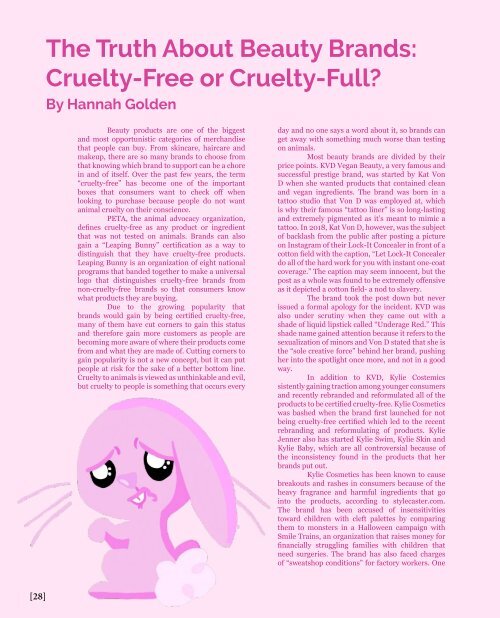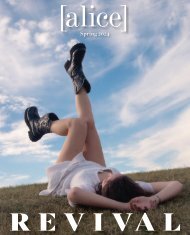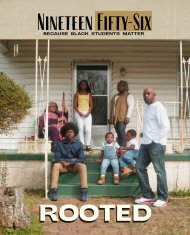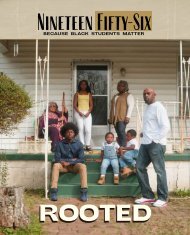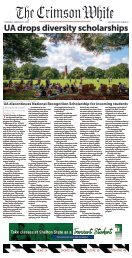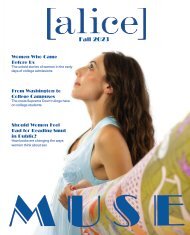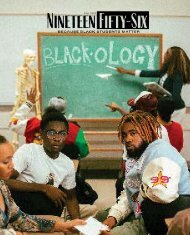Alice Vol. 7 No. 2
It’s important that here at Alice, we continue to illuminate the issues and topics that matter even in the darkest months of the year. In this issue, we have interactive quizzes, suggestions on what to watch next, personal anecdotes about body hair, a female DJ, the science behind your monthly chocolate cravings and even more.
It’s important that here at Alice, we continue to illuminate the issues and topics that matter even in the darkest months of the year. In this issue, we have interactive quizzes, suggestions on what to watch next, personal anecdotes about body hair, a female DJ, the science behind your monthly chocolate cravings and even more.
You also want an ePaper? Increase the reach of your titles
YUMPU automatically turns print PDFs into web optimized ePapers that Google loves.
The Truth About Beauty Brands:<br />
Cruelty-Free or Cruelty-Full?<br />
By Hannah Golden<br />
Beauty products are one of the biggest<br />
and most opportunistic categories of merchandise<br />
that people can buy. From skincare, haircare and<br />
makeup, there are so many brands to choose from<br />
that knowing which brand to support can be a chore<br />
in and of itself. Over the past few years, the term<br />
“cruelty-free” has become one of the important<br />
boxes that consumers want to check off when<br />
looking to purchase because people do not want<br />
animal cruelty on their conscience.<br />
PETA, the animal advocacy organization,<br />
defines cruelty-free as any product or ingredient<br />
that was not tested on animals. Brands can also<br />
gain a “Leaping Bunny” certification as a way to<br />
distinguish that they have cruelty-free products.<br />
Leaping Bunny is an organization of eight national<br />
programs that banded together to make a universal<br />
logo that distinguishes cruelty-free brands from<br />
non-cruelty-free brands so that consumers know<br />
what products they are buying.<br />
Due to the growing popularity that<br />
brands would gain by being certified cruelty-free,<br />
many of them have cut corners to gain this status<br />
and therefore gain more customers as people are<br />
becoming more aware of where their products come<br />
from and what they are made of. Cutting corners to<br />
gain popularity is not a new concept, but it can put<br />
people at risk for the sake of a better bottom line.<br />
Cruelty to animals is viewed as unthinkable and evil,<br />
but cruelty to people is something that occurs every<br />
day and no one says a word about it, so brands can<br />
get away with something much worse than testing<br />
on animals.<br />
Most beauty brands are divided by their<br />
price points. KVD Vegan Beauty, a very famous and<br />
successful prestige brand, was started by Kat Von<br />
D when she wanted products that contained clean<br />
and vegan ingredients. The brand was born in a<br />
tattoo studio that Von D was employed at, which<br />
is why their famous “tattoo liner” is so long-lasting<br />
and extremely pigmented as it’s meant to mimic a<br />
tattoo. In 2018, Kat Von D, however, was the subject<br />
of backlash from the public after posting a picture<br />
on Instagram of their Lock-It Concealer in front of a<br />
cotton field with the caption, “Let Lock-It Concealer<br />
do all of the hard work for you with instant one-coat<br />
coverage.” The caption may seem innocent, but the<br />
post as a whole was found to be extremely offensive<br />
as it depicted a cotton field- a nod to slavery.<br />
The brand took the post down but never<br />
issued a formal apology for the incident. KVD was<br />
also under scrutiny when they came out with a<br />
shade of liquid lipstick called “Underage Red.” This<br />
shade name gained attention because it refers to the<br />
sexualization of minors and Von D stated that she is<br />
the “sole creative force” behind her brand, pushing<br />
her into the spotlight once more, and not in a good<br />
way.<br />
In addition to KVD, Kylie Costemics<br />
sistently gaining traction among younger consumers<br />
and recently rebranded and reformulated all of the<br />
products to be certified cruelty-free. Kylie Cosmetics<br />
was bashed when the brand first launched for not<br />
being cruelty-free certified which led to the recent<br />
rebranding and reformulating of products. Kylie<br />
Jenner also has started Kylie Swim, Kylie Skin and<br />
Kylie Baby, which are all controversial because of<br />
the inconsistency found in the products that her<br />
brands put out.<br />
Kylie Cosmetics has been known to cause<br />
breakouts and rashes in consumers because of the<br />
heavy fragrance and harmful ingredients that go<br />
into the products, according to stylecaster.com.<br />
The brand has been accused of insensitivities<br />
toward children with cleft palettes by comparing<br />
them to monsters in a Halloween campaign with<br />
Smile Trains, an organization that raises money for<br />
financially struggling families with children that<br />
need surgeries. The brand has also faced charges<br />
of “sweatshop conditions” for factory workers. One<br />
ex-employee even stated that she would become sick<br />
after inhaling the particles all day with no protective<br />
wear. Because of this, Kylie Cosmetics has faced a<br />
lot of backlash from customers but continues to gain<br />
popularity with a younger generation of consumers<br />
that idolizes the Kardashian-Jenner family and as<br />
social media influencers get paid to promote the<br />
brand, making their reach far and wide.<br />
Prestigious brands of skincare have had<br />
their share of the spotlight, as well. Drunk Elephant<br />
is a popular skincare brand that was founded by<br />
Tiffany Masterson in her own kitchen because<br />
she wanted skincare that was quick, easy and<br />
effective. She built the brand’s popularity on the<br />
concept of a ‘skincare smoothie’ where the products<br />
could be combined for different effects and easier<br />
use. Masterson sold her company to Shiseido, a<br />
popular Japanese skincare brand, to expand where<br />
Drunk Elephant products are sold and how many<br />
products can be made, making the brand even more<br />
accessible.<br />
Drunk Elephant, however, has not avoided<br />
the spotlight. According to The Cut, Drunk Elephant<br />
used a fake account to bash Glossier, another beauty<br />
brand, for using fragrance in their skincare products.<br />
Fragrance is one of Drunk Elephant’s “sinister six,”<br />
a concept they use to define the six worst ingredients<br />
in a skincare product. Additionally, Drunk Elephant<br />
has been accused of being racist towards BIPOC<br />
(Black, Indigenous and People of Color) and using<br />
offensive terms like “human inventory” to refer to<br />
their staff and brand representatives. <strong>No</strong>t only is<br />
the term “human inventory” a little off, but it is also<br />
referring to people as objects which is offensive to<br />
anyone.<br />
In addition, Mackensey Haupt, a manager<br />
at Ulta Beauty and a licensed esthetician, stated<br />
that she had a personal interaction with the current<br />
president of the company in which she asked a<br />
question regarding the ingredients of a product on<br />
a live stream and was immediately blocked.<br />
She said,“brand reps are not properly<br />
trained” by estheticians on products and how<br />
ingredients work with different skin types, leading<br />
to misinformation to customers.<br />
Facing negative attention along with Drunk Elephant<br />
is a prestigious skincare brand named Sunday Riley.<br />
While the skincare brand has recently been growing<br />
in popularity because of its good ingredients and<br />
effective treatments, Sunday Riley had to make<br />
false claims to get to the level of popularity they<br />
are at now. According to The New York Times, the<br />
brand has been accused of writing fake reviews on<br />
Sephora’s website to make the products seem more<br />
effective than they actually are. The reviews were<br />
written by Sunday Riley employees and posted on<br />
the Sephora website in order to boost sales.<br />
The New York Times also provided<br />
evidence of an email that the company’s CEO<br />
and namesake, Sunday Riley, sent to one of her<br />
employees that stated the employee should write<br />
positive reviews and dislike negative ones so that the<br />
negative reviews would be taken down, making only<br />
the positive reviews visible and therefore boosting<br />
sales. Rather than relying on the quality of products,<br />
Riley thought it was better to falsify reviews to make<br />
her products seem better than average. The brand<br />
still continues to gain popularity because of the<br />
good-for-you skincare ingredients, so why didn’t<br />
Riley trust in her products in the first place? This<br />
falsification of reviews leads consumers to believe<br />
that there are other possible misdemeanors the<br />
brand and Riley could be involved in, but there has<br />
been no news of a large-scale scandal so far.<br />
There have also been issues with the<br />
quality of products that Sunday Riley has been<br />
selling. One of the brand’s most popular products,<br />
the Tidal Brightening Enzyme Water Cream, has<br />
been returned to Ulta, not once, but twice, on claims<br />
of mold growing in the product, and they were true.<br />
I have personally encountered the product having<br />
mold and the guest said it was “disgusting” and that<br />
it “smelled terrible.” There have also been reviews<br />
from a few different sites that say they received<br />
faulty product so it is a recurring issue. Ulta had<br />
the employees pull the Tidal Cream from the shelf<br />
so that no more customers would be at risk, so<br />
there is a possibility that Sunday Riley knows their<br />
product is causing issues and will work to fix it, but<br />
there has not been any indication that the process of<br />
reformulation has started.<br />
Beauty brands are constantly competing with each<br />
other to gain popularity and boost sales to remain<br />
on top which often comes at the expense of their<br />
customers. While brands may not test on animals,<br />
they may not be as completely cruelty-free as they<br />
want the public to believe. There are often a lot of<br />
behind-the-scenes acts that take place and put real<br />
people at risk. Doing research before supporting<br />
a beauty brand is vital because an uninformed<br />
consumer might never know what kind of people<br />
are running the show and what kind of damage they<br />
have done to others.<br />
[28]<br />
[29]


